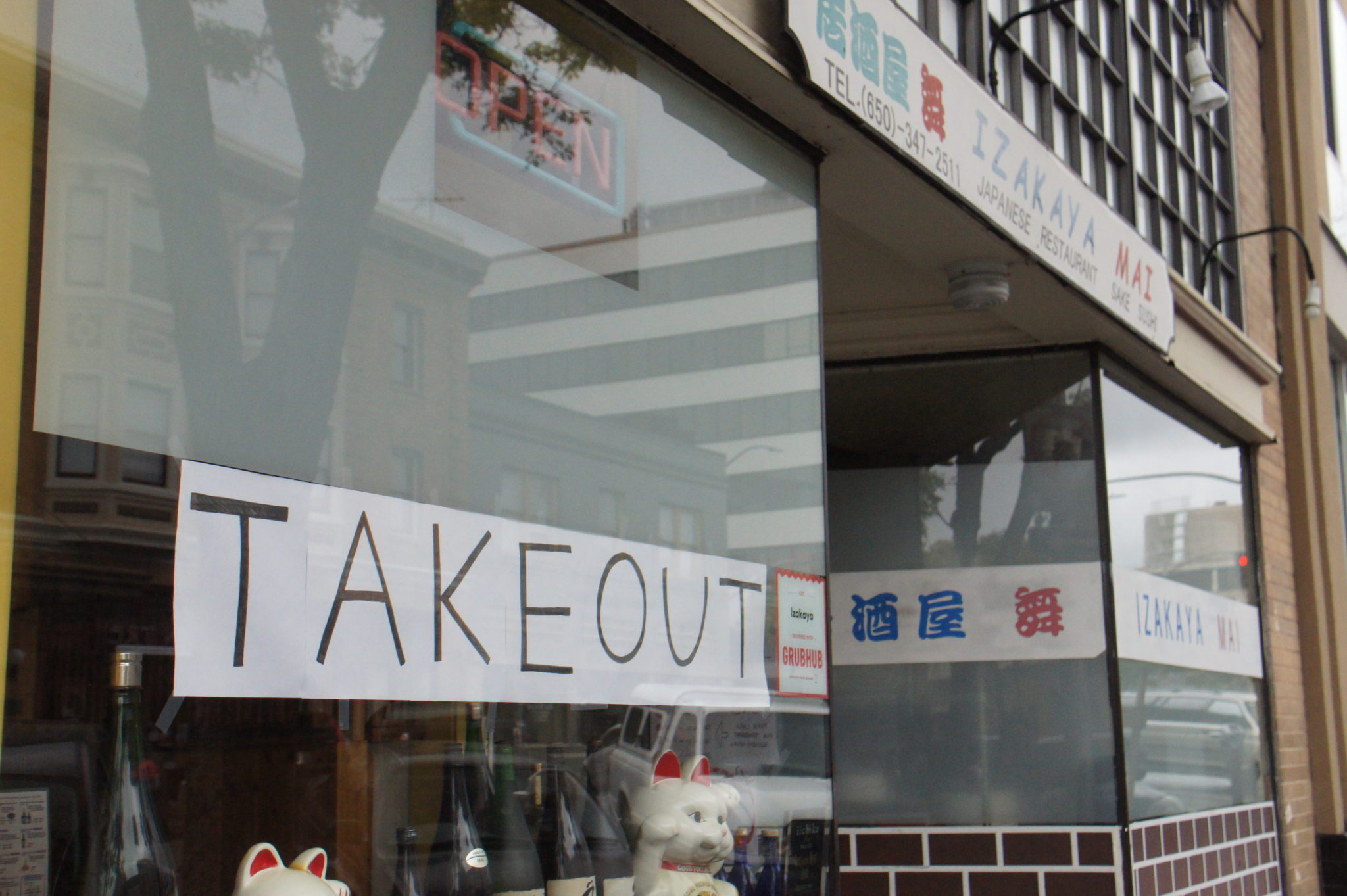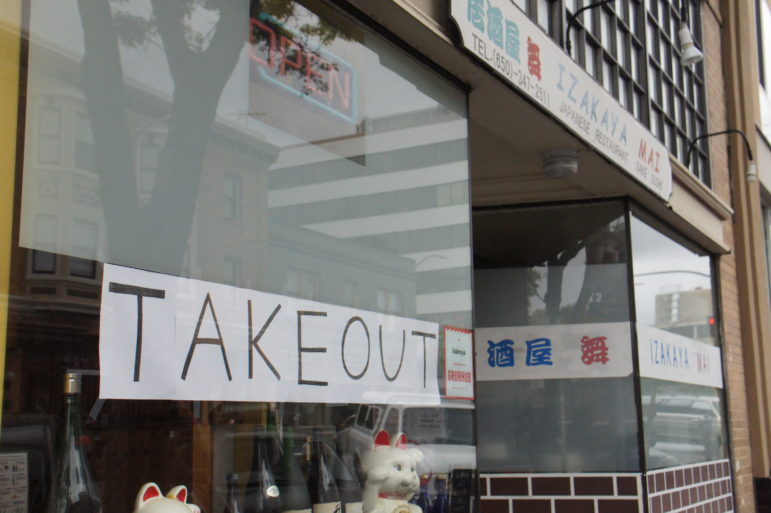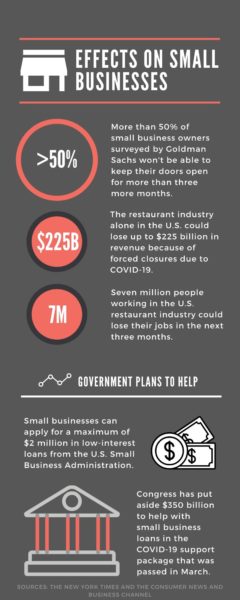
SONY DSC

Additional reporting by Joshua Wing
With the outbreak of the COVID-19 virus, the Bay Area responded with a shelter in place order and the closing of non-essential businesses. According to Business Insider, distinguishing between nonessential and essential business may vary by location, but examples of nonessential businesses can include museums, restaurants, shopping malls and salons. On the other hand, essential business usually consist of banks, pharmacies and post offices. This order leaves the question, however, what is going to happen to smaller businesses?
Junior Ryan Macnamara’s mother owns paint-and-sit studio Create Mix and Mingle in San Mateo which normally hosts painting events for birthday parties and other activities. With the COVID-19 outbreak, however, this routine has been compromised, even before the shelter in place order.
“It’s been pretty rough. We noticed about a month ago business was starting to slow down. And it hasn’t gone back up and especially within the past two weeks,” said Macnamara. “We had our last event last Saturday and there was nothing. Even before then we were having tops three people where we would normally have like 30 people show up to an event. Now it’s not even legal for people to come in, so what small amount of business we were having is now just nothing.”

This lack of regular business for small companies can potentially be detrimental. According to the HuffPost, small businesses play an important role in economies in that they provide competition for larger businesses as well as provide local jobs.
Junior Timothy Ho works part-time at Meet Fresh, a Taiwanese dessert restaurant in San Mateo, which unlike some smaller businesses, has been allowed to keep its doors open.
“Usually it’s not that full,” Ho said. “Not many people will come in on weekdays because I work from 3 to 7. So not many people come in [usually]. But right now all we’re only allowing people to buy to go and … [through] Uber eats. I still can’t tell yet because last Saturday, before [the statewide restriction on non-essential business], it was still fine.”
Ho’s primary concerns about working during the outbreak are mainly centered around his health.
“I don’t want to get the coronavirus because there’s still a decent amount of people coming in, and I have to talk to them. I just don’t really want to get [coronavirus],” Ho said.
For essential businesses, like Mustafa Mutlu’s independent market Crystal Springs Produce, the pandemic has caused issues in supply.
“People are buying a lot … and we usually don’t have so much [in stock],” Mutlu said. “Customers are looking for things that we don’t have much [of].”
Crystal Springs Produce is a compact space, where social distancing is difficult to maintain. On their social media, the market has recently asked for face masks to protect their workers and customers.
Along with health issues, COVID-19 has brought on additional issues for businesses during this time regarding finances. Macnamara worries about future implications for his family’s business due to COVID-19.
“I don’t have a lot of hope,” Macnamara said. “It’s a pretty dark time. I don’t want to self pity too hard, but there’s just straight up nothing. We’re trying to figure out how we’re gonna make it next month, you know what I mean? When you’re literally not getting a single person to come in, … it’s scary, and we don’t know what the solutions are right now. We’re trying to figure that out, but everyone’s kind of panicked right now, which probably isn’t the ideal state to be in, but it’s kind of hard not to be.”
“I don’t have a lot of hope … It’s a pretty dark time.”
Dr. Wen Wu, an Aragon parent, owns a dental office in Foster City. Like Macnamara, the COVID-19 outbreak has had a severe impact on his business too.
“Based on the CBA guidance and also [the] Dental American Association guidance, the office had to close until further notice,” Wu said. “We only can treat the patient for emergency care. That means, if they have pain or toothache [we] have to take care, but no major procedures, like, you cannot use handpiece or drill tools, or else the virus can pass to each person. The virus [can be spread through close contact], so that means a lot of procedures have to stop.”
In a message to customers, Mutlu said “this is a time not just for ‘staying well’ but for ‘staying well together…[and]… that our power lies in we, not I. Our, not my. Us, not them.”
“This is a time not just for ‘staying well’ but for ‘staying well together…[and]… that our power lies in we, not I. Our, not my. Us, not them.”
Unlike Macnamara, Wu is not as worried for the future yet, but does have concerns about the current unpredictability of the COVID-19 outbreak.
“Nobody can predict when it’s gonna stop and go away,” Wu said.“But the whole country and whole world is working on it. I think eventually this outbreak is gonna go away, … but [if] it lasts longer, it can damage [the economy] and then a lot of people are going to get laid off. And then, consumers will stop spending. …. [This would] not only [impacting] my business, but also retail companies.”
Congress has responded to the COVID-19 outbreak in relation to business by passing the Families First Coronavirus Response Act (FFCRA). According to the U.S. Department of Labor, FFCRA requires “certain employers to provide their employees with paid sick leave or expanded family and medical leave for specified reasons related to COVID-19.” The U.S. Small Business Administration is also providing assistance to help small local businesses with “accessing federal resources and navigating their own preparedness plans as described by the CDC’s Guidance for Businesses and Employers.”
These types of laws protect the employees of businesses, including Wu’s dentistry office.
“As an employer [and] as an owner, we still give employees sick leave … also we can claim disability insurance … so they can get a paycheck from them because as the owner, every month we pay the insurance for them, now they can claim it,” Wu said.
On the other hand, Wu worries for himself, as this insurance does not apply to him as the owner of his business.
“[We have] no income for at least who knows how long. … We are self-employed so we cannot [claim] insurance because we are the owner, and only employees can claim for that,” Wu said.
Macnamara hopes for government support to help small local businesses during quarantine.
“I think that the government should enact emergency universal basic income,” Macnamara said. “How much is up for grabs, but I’d say somewhere between 1000 to 3000 dollars. … Even President Trump is considering it right now, which means we’re screwed [because he’s considering] these liberal ideas. But I think that’s the best way to keep people from getting evicted from their houses. I’m not exactly sure what they should do for small businesses, but I mean, we can’t continue to keep watching. And it really sucks how they haven’t considered any action until the stock market crash. Like this was a problem a month ago. I mean, none of us took it as seriously as we probably should have.”
“None of us took it as seriously as we probably should have.”
As of late March, the US Senate passed $2.2 trillion coronavirus stimulus packages in order to aid and speed relief across the American economy. These stimulus packages impact groups from individuals , small businesses, corporations, public health, state and local governments, and education according to NPR.
The Coronavirus Aid, Relief, and Economic Security Act (CARES) is one of these packages and directly aids individuals and businesses and is the largest stimulus package in US history. In comparison, the 2009 Stimulus Package (or American Recovery and Reinvestment Act of 2009) was around $800 billion while the CARES Act is around $1.8 trillion.
During this time where consumerism is at an all time low for many companies, especially small businesses, it is important to recognize the importance to support local and family-owned businesses. Macnamara also stresses the importance of spending money during this time where local businesses have a large decrease in customers.
“If businesses, small businesses [are] selling merchandise, now would be the time to buy it, especially artists. If you want to support local artists or even semi popular ones, it’s a really hard time [right now]. People like musicians can’t tour and stuff like that. Buy your favorite albums. … I [and other artists] do commissions, make sure to buy those if you can, [but] obviously not everyone is in the financial situation to do that. Prioritize yourself. However, if you do have money to spare for people, I’m sure it’s greatly appreciated. Buy your favorite albums, all that good stuff,” Macnamara said.
There is hope for the future of support for small businesses, though, as the federal government has recently announced that lawmakers and the Trump administration are closing in on an agreement over $450 billion which would help a program for small businesses affected by COVID-19, according to the Wall Street Journal.




